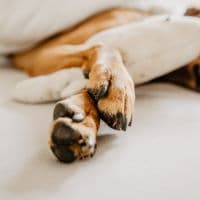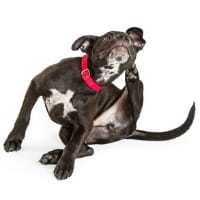FYI: If you buy something through a link on this site I may earn a commission - at NO extra cost to you.
Why Do Dogs Lick So Much?
Dog licks can be affectionate, submissive, welcoming, exploratory, soothing, healing... and more.
Licking is a natural, instinctive behavior for dogs.
Some dogs aren't big lickers, saving their licks for special occasions (or something especially tasty), while others seem to want, and need, to lick everything. All. The. Time. So, why do dogs lick so much?
The answer is... it depends! That's because what your dog is licking, and how often, is usually the answer to the why. Or at least it gets you in the ballpark.
Let's take a closer look at the most common reasons dogs lick, and their favorite targets.
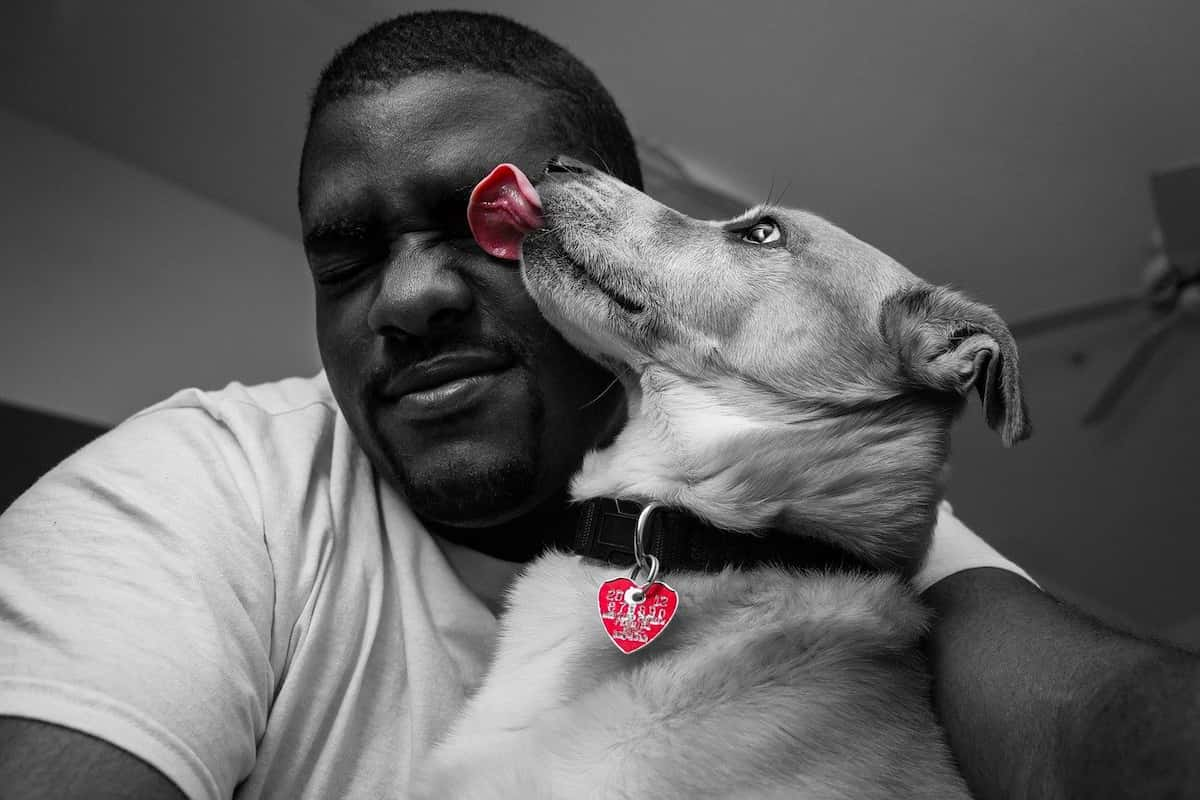
Why does my dog lick me?
Dogs communicate with people by using body language and a handful of vocalizations. Licking would fall under the 'body language' category and licking is a form of communication for dogs.
Your dog's licking can be a sign of affection, a greeting or a way of welcoming you home.
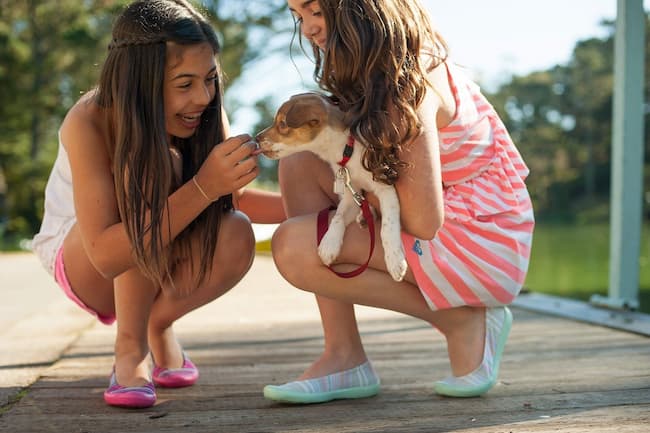
In the wild, canids like wild dogs, wolves and coyotes often lick each other to show affection, or to say hello.
When their young pups are being weaned they'll often lick their mother's mouth when she returns to the den, but this isn't a sign of love, it's to encourage her to regurgitate some food for them!
An instinctive behavior in puppies and young dogs (both wild and domestic) is to lick the faces of adult dogs during some social interactions.
Licking can also be a sign of submission.
Submissive dogs tend to be big on licking, and this may be a nod to the way wolves and other wild canids lick the face of the alpha male, to show they respect his authority.
Licking the face of another dog when playing, or interacting, is often a way of showing submissiveness, and this applies to their licking of people too!
Moving beyond communication to more practical reasons, your dog may be licking you because he wants to 'taste' you.
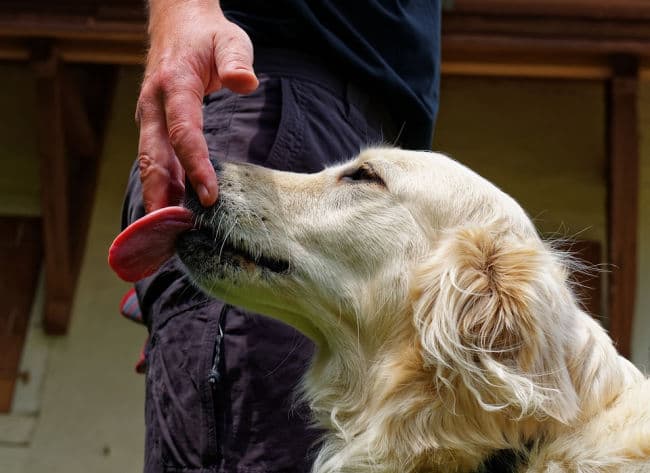
That sounds odd, but it can be true. Do your hands smell like food? Are you sweaty (which makes your skin taste salty)? Have you been around other dogs or animals?
Do you have a cut or wound? A dog's instinct is to lick to heal, so he may be trying to help out.
There have been occasions where dogs have dedicatedly sniffed or licked an area of their owners body, or skin, for no apparent reason, only for their owner to find out later that they had cancer or some other medical problem there.
Now, this is rare, and I'm not trying to scare you or have you run out and visit the doctor because your dog keeps licking your hands, feet or whatever. But it is something to bear in mind.
When a dog licks it can boost his sense of smell, so if he wants to find out more about how something smells he may lick it as well as sniff it.
Why do dogs lick themselves?
An injury such as an open wound, a cut or scrape, or a surgical incision, can be uncomfortable, painful or tight, and a dog's natural and instinctive reaction is to lick the area in an attempt to make it feel better, and hopefully to heal it.
In fact, dog saliva contains antibacterial and antimicrobial properties which can help to minimize infection, and a little licking doesn't hurt. But if your dog keeps licking a certain area over an extended period, you need to discourage that behavior for the same reasons as I talked about above.
When it comes to the excessive and chronic licking that accompanies infections and allergies, it's important to have your dog examined by your veterinarian quickly to prevent things from getting worse.
Your vet will need to treat the medical reasons for the itching, as well as the results of the licking.
He/she may also suggest a cone, surgical suit or wrapping to prevent your dog from licking himself while the area heals. Cones are common practice after surgery for this very reason.
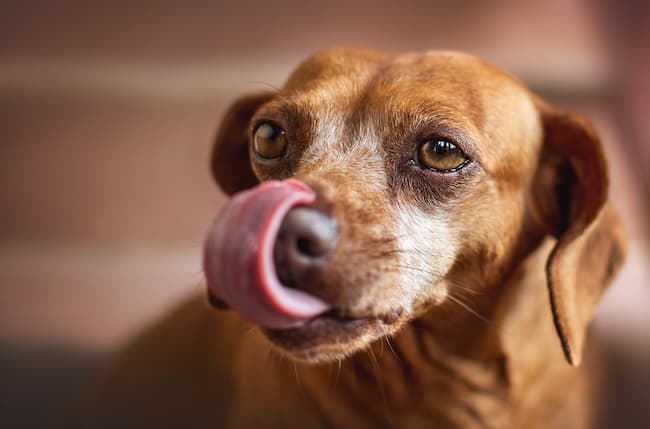
There are a variety of reasons why dogs lick themselves, the most common ones being that they're trying to relieve pain or itching, or trying to heal a wound.
Licking is a normal part of grooming, although dogs don't lick/groom themselves as consistently and thoroughly as cats do! If your dog has stickers or burs in his coat, something sticky or tangled he's likely to lick and nibble at it to try to fix the problem.
But if it goes beyond that there's likely something else going on.
Itching can be caused by a yeast infection, environmental allergies, food allergies, parasites (such as fleas), ringworm, hot spots (often caused by an allergen) and more.
Itching can be caused by a yeast infection, environmental allergies, food allergies, parasites (such as fleas), ringworm, hot spots (often caused by an allergen) and more.
A yeast infection is a common cause of excessive licking in dogs, especially paw licking.
A dog's paws can get extremely itchy with this type of fungal infection, and it can also be the trigger for a more generalized itching, hair loss, ear problems and more. You can check out this page for more info. on recognizing and dealing with a yeast infection. That article also has lots of information on other dog paw problems.
Occasional paw licking could just be your dog cleaning his feet or trying to remove something from between his toes or in his fur, but continual licking is cause for investigation.
An allergic response to flea saliva is another thing that can cause dogs to be intensely itchy, and to lick themselves in an effort to relieve it.
It doesn't take many fleas to cause a LOT of itchiness, and the combination of bites, saliva (the flea's and the dog's), and abrasive licking can lead to medical problems such as localized inflammation and/or infection.
Another cause of a dog's itchy skin (and the subsequent licking) are allergies of all kinds. Allergies in dogs can be environmental, topical, or (very common) food related.
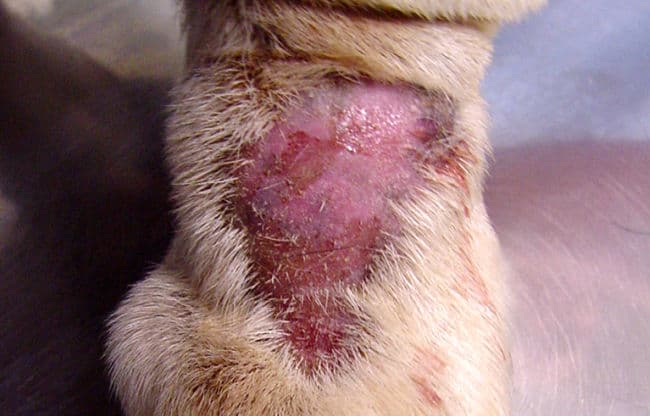 Own work, CC BY-SA 3.0, https://commons.wikimedia.org/w/index.php?curid=1385273 Lick Granuloma
Own work, CC BY-SA 3.0, https://commons.wikimedia.org/w/index.php?curid=1385273 Lick GranulomaSkin irritation, itching, inflammation, redness or swelling can point to an allergic reaction being the problem, and your dog's desperate licking, rather than helping, often makes the whole situation worse.
This is because the constant wetness and abrasion of the licking causes more irritation, breaks down the skin barrier over time and can cause secondary conditions such as Lick Granuloma (aka Acral Lick Dermatitis) or a bacterial infection.
Why do dogs lick.... everything??
Does your dog lick his bed, the furniture, carpet, floor, a specific toy etc?
Occasional licking like this, depending on where it's happening (ie under the kitchen table or the foot-rest or legs of the baby's high chair for example), can be totally normal, just your dog's attempt to lick up something tasty. Dropped crumbs and smeared chair legs are good reasons for a bit of licking!
Chronic or obsessive licking of objects, or even toys (not edible or flavored ones obviously), however, is not normal behavior but a behavioral issue caused by an underlying problem such as anxiety, fear, separation anxiety, boredom, obsessive-compulsive disorder, over-stimulation, cognitive issues etc.
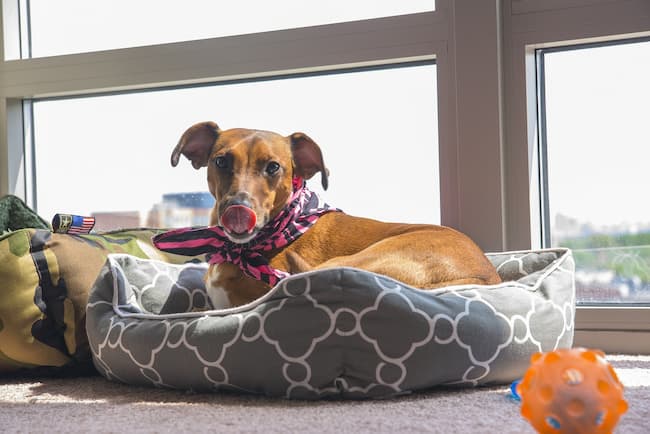
Licking is a calming action for dogs and sometimes what was normal licking as a reaction to a short term situation or issue, becomes so habitual that it turns into a problem, either behaviorally (OCD), or physically (causing inflammation or infection).
Either way, compulsive licking needs to be evaluated by a professional.
First step may be a veterinarian to rule out any underlying cause such as a medical issue that's gone undetected, but if your dog gets a clean bill of health a dog behavioral specialist (or animal behaviorist) is a good next step.
Finding the cause of the behavior, and then getting your dog appropriate behavior modification and/or training could make the world of difference and reduce the problem licking over time, hopefully eventually eliminating it all together.
Things that can help with this problem include:
- Increased daily exercise
- Interactive toys or puzzle toys
- Regular training sessions
- Doggie-daycare
- Dog-sitter or dog walker to break up long lonely days
- Durable chew toys that provide plenty of time for appropriate chewing and licking
All of these can really help dogs who are bored or under-stimulated (which can lead to OCD behaviors including licking).
For a scared, anxious or over-sensitive dog, a Thunder Shirt, calming pheromone diffusers or collars, CBD oil, calming music, aromatherapy and more are all great options.
Once the anxiety levels come down, there's a good chance the amount of licking will follow suit.
About Lick granulomas...
Lick granuloma is most often seen on a dog's front legs (possibly in part because they're pretty easy for a dog to lick continuously).
What may start out as a small abrasion, scrape or irritation (such as an insect bite or sting) or itching due to allergies, can quickly become a much larger area of red, inflamed, oozing skin... and the more your dog licks, the bigger it gets.
Secondary bacterial infection is common and it's just an all-around unpleasant condition.
Lick granulomas are equally likely to be formed by OCD licking related to behavioral issues such as stress, anxiety or boredom, as they are to physical problems.
The treatment option is the same for both situations and early detection and treatment are key to preventing serious skin damage, and to break the cycle of constant licking which is to blame.
Some dog breeds seem to be more at risk of developing lick granulomas than other, these include:
- Doberman Pinschers
- Golden Retrievers
- Great Danes
- Irish Setters
- Labrador Retrievers
But, it's important to know that the condition can affect any dog, of any breed or size.
you might also like...
FTC Disclosure: Some pages on this site contain affiliate links. I may earn on qualified purchases.
